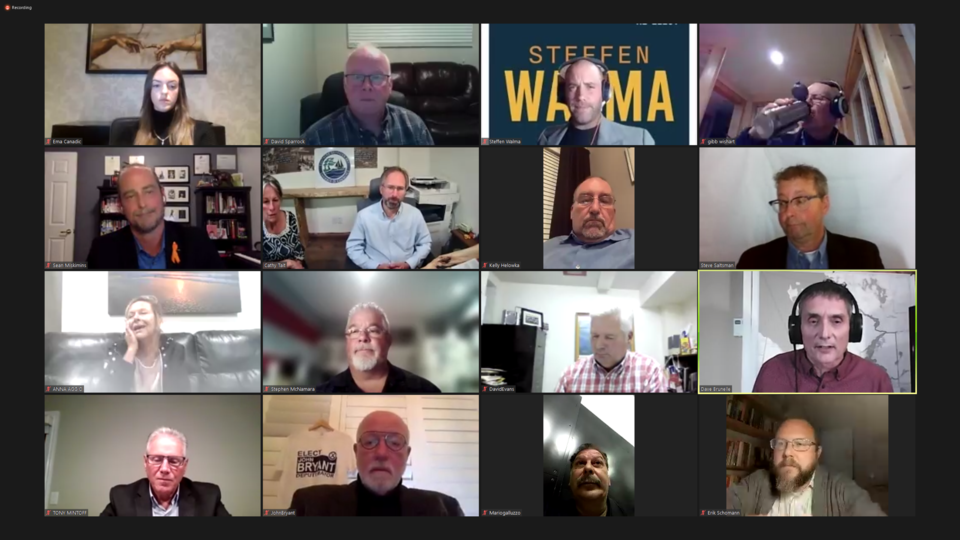A discussion on the remuneration of council heads for Tiny Township at the recent regular meeting led to a tangent on how to support a living wage to attract a younger demographic to the political arena while they serve their municipality.
The topic arose during a routine annual bylaw for the Municipal Act to set the amounts a municipality can compensate for remuneration and paid expenses of its council to attend functions relating to governance.
Coun. Steffen Walma, the sole returning council member from his previous role as deputy mayor last term, addressed the potential of reviving a remuneration committee which had been proposed to the public in 2022, but failed when only one applicant showed any interest to participate.
“This is something that I think is important if we’re talking about recruitment and retention of councillors in the future,” said Walma during the meeting.
“If you were to look at the pay scale now,” Walma continued, “you attract retirees, the independently wealthy… people who have time. It’s very hard to hold a job of any career and be present for all of this.”
His pitch to council was that another examination for public input to a remuneration committee could be put together “sooner than the last year of council so that we could start putting something together – for the future term, not this one,” Walma was quick to clarify.
Deputy Mayor Sean Miskimins agreed, stressing the importance on the participation from younger generations as a problem he had been giving thought toward.
“How do we attract younger people to these roles?" Miskimins mused. "Because they play a vital part in our community and I think they’ve got some great ideas for leading municipalities such as ours into the future.”
Citing his off-council job within human resources, Miskimins stated, “If I understand the implications of that younger workforce: they’re new to their career, they’re starting out, they may not have as much credibility in their organizations to afford them the amount of time that’s required off the job to fully commit to roles such as this.”
Miskimins further proposed that council could craft a letter for local, regional, and provincial entities to advocate for job protection of those in office, “particularly for the younger generation that aren’t afforded the same protections or have accrued the same vacation time as many of us who are established in our careers. I think that is absolutely something that detracts a younger person from jumping into the game of politics.” Walma agreed, but offered to look into it with Miskimins as a separate matter for a future meeting.
However, Mayor Dave Evans provided a light warning that the good intentions of Miskimins’ letter may not be adopted due to the matter being an issue across many municipalities, as speaking from his role on the Simcoe County governance committee.
“At county, we’re remunerated a fraction of what we are here, and attracting people is the same demographic that we get everywhere,” Evans explained.
“This is a pervasive issue that’s duplicated throughout Ontario, and I’ll leave it in that context. But it’s largely focused on upper- and lower-tier municipalities. If you’re in Mississauga or in another larger urban municipality, councillors there are making… better than a living wage,” Evans noted. “I would not think that this is ever a living wage for anybody, and people are doing it for the right reasons… to make their community better. “
Miskimins apologized for not attending the county governance meeting where the matter was discussed, adding with humour that he “had to get back to the day job.”
He proposed addressing the issue at the annual Associations of Municipalities of Ontario conference; CAO Robert Lamb further offered that a comprehensive report could be brought to council, updated from information obtained during the previous term.
As an increase of two per cent from the previous year, remuneration for the Mayor’s position was set at $43,075; with $32,300 for the Deputy Mayor and $28,000 for council members.
For comparison, the township’s highest-paid employed staff member last year was CAO Robert Lamb at $176,296 according to the annual provincial Sunshine List from late March of 2023. However, the history of the Sunshine List began with its introduction in 1996 for public-sector employees whose salaries exceed $100,000; inflation calculations place that 1996 value at roughly $177,000 in 2023 dollars.
The remuneration of council bylaw, including Municipal Act compensation requirements for a list of council-related activities, can be viewed on the agenda page on the Township of Tiny website.
Archives of council meetings are available to view on the township’s YouTube channel.



